When it comes to a list of the most romantic leading men in film history one name stands out as creating a true “air” of love in all of his performances: the one and only Pepe Le Pew.
Undeterred by his own fragrant shortcomings, this socially active skunk has continually sought his true love through seventeen classic short subjects. Debuting in 1945 and becoming a popular member of the Warner Bros. cartoon canon, in his never-ending pursuit of “amore,” Pepe Le Pew could stand aside (maybe by six-feet or more) Cupid, as the perfect ambassador for Valentine’s Day.
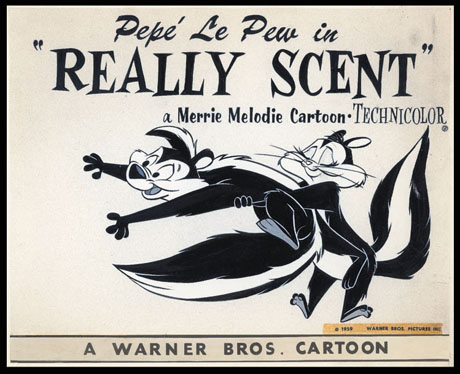
Pepe was the creation of animation legend Chuck Jones, who, in his book Chuck Reducks, humorously commented on how Pepe was actually a hopeful part of his own persona. Jones wrote:
“Pepe is the individual I always wanted to be, so sure of his appeal to women that it never occurs to him that his attentions might be unwelcome, or even offensive. I tried to make Pepe’s confidence a part of my own personality, hoping to share in his sexual success. On the screen it worked.”
Pepe made his debut on January 6, 1945 in the short Odor-able Kitty. Which Jones directed from a story by Ted Pierce. In the short, a cat who is abused by both human and canine wishes to be a skunk and actually paints themself to look like one. They even smear limburger cheese on, in order to complete the ruse.
The cat is able to get both human and dog away from him and even clears out the butcher shop, but when he makes his way to the woods to enjoy the spoils, he is suddenly pursued by an actual skunk (our hero, Pepe).
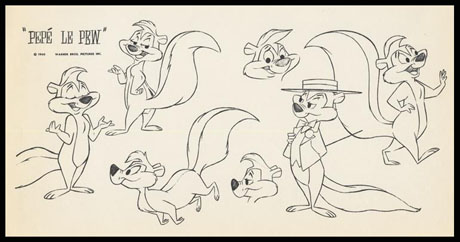
There is some immediate mistaken identity, as Pepe is infatuated. “Where have I been all your life?!,” Pepe coos to the “skunked cat.” As Pepe continues to pursue the cat, the short follows a formula that would be a part of all of Pepe’s future adventures, save for one major difference here.
In Odor-able Kitty, we find out at the end of the short that Pepe is actually married with kids and he is actually being unfaithful and is discovered by his wife (!). When he tries to explain, we also learn that Pepe is hiding a very New York-sounding accent.
This would be changed in future Pepe LePew short subjects, as he would embrace his French heritage, complete with a backdrop of France in the short subjects and almost continually pursue the same feline. His love interest would eventually be named Penelope Pussycat. In the shorts, Penelope, is a black cat who finds a white stripe accidentally painted down her back, usually by rubbing up against paint.

This would then lead to Pepe’s amorous pursuits and there were different, subtle variations on this through the years. However, many fans feel that Pepe truly hit his stride with the 1949 short For Scent-imental Reasons, which went on to win that year’s Academy Award.
In the short, the tables get turned on Pepe, when he is covered in blue paint and Penelope is dunked in water that leaves her with an unkempt appearance. Penelope then winds up pursuing Pepe, who wants nothing to do with her.
There was another variation in Scent-imental Over You (1947), in which Pepe falls for a dog who has donned a skunk pelt. In his last theatrical short 1962’s Louvre Come Back to Me! (love that word-play), which has such a beautiful Chuck Jones/Maurice Noble flair to its character design and backgrounds, Pepe winds up in a love triangle with cat named Pierre. They both pursue Penelope, but Pepe continues to knock him out with his “fragrant personality.”
Through all of these films, the legendary Warner Bros.’ man of a thousand voices, Mel Blanc, who based the character on the smooth, almost musical vocal tone of French actor Charles Boyer, most famous for the 1944 film Gaslight.
The voice Blanc provided was also similar to a character named “Professor LeBlanc,” who he portrayed on The Jack Benny Radio Show.
Even after his theatrical short subjects ended, Pepe Lew Pew continued to be a major player in the Warner Bros. cartoon canon, with appearances in films like Space Jam (1996), Looney Tunes: Back in Action (2003), later TV specials and the series Tiny Toon Adventures in the 1990’s.
For the past decade, Pepe has been dogged by politically correct forces who don’t understand the parody the character is based on. At the same time, there have also been rumors of a feature length film Pepe Lew Pew film in the works – before the current Warner Bros. Discovery merger.
What the future holds for Pepe is hard to predict – but the fact that audiences want more of Pepe is proof of just how much we love how much he loves… love. A skunk who has such amorous affections is definitely one of animation’s most creative, high-concepts. As author Steve Schneider wrote in his book, That’s All Folks: The Art of Warner Bros. Animation, when discussing Pepe LePew: “A more delicious premise is hard to find.”
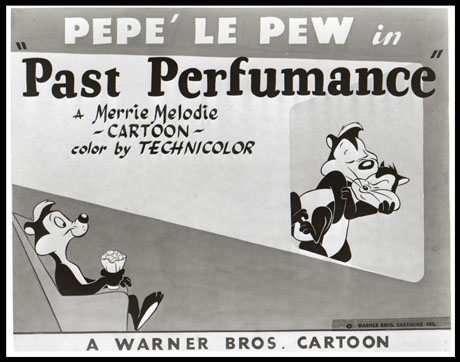


 Michael Lyons is a freelance writer, specializing in film, television, and pop culture. He is the author of the book, Drawn to Greatness: Disney’s Animation Renaissance, which chronicles the amazing growth at the Disney animation studio in the 1990s. In addition to Animation Scoop and Cartoon Research, he has contributed to Remind Magazine, Cinefantastique, Animation World Network and Disney Magazine. He also writes a blog, Screen Saver: A Retro Review of TV Shows and Movies of Yesteryear and his interviews with a number of animation legends have been featured in several volumes of the books, Walt’s People. You can visit Michael’s web site Words From Lyons at:
Michael Lyons is a freelance writer, specializing in film, television, and pop culture. He is the author of the book, Drawn to Greatness: Disney’s Animation Renaissance, which chronicles the amazing growth at the Disney animation studio in the 1990s. In addition to Animation Scoop and Cartoon Research, he has contributed to Remind Magazine, Cinefantastique, Animation World Network and Disney Magazine. He also writes a blog, Screen Saver: A Retro Review of TV Shows and Movies of Yesteryear and his interviews with a number of animation legends have been featured in several volumes of the books, Walt’s People. You can visit Michael’s web site Words From Lyons at: 












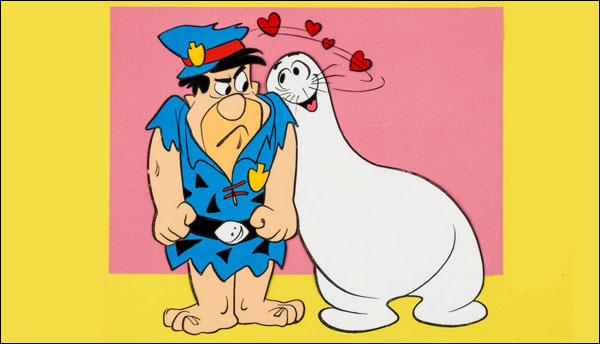
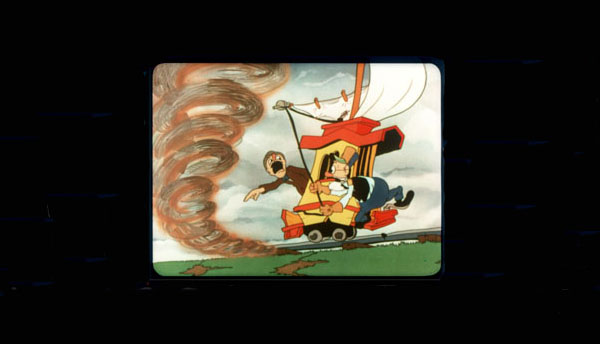








Pepe le Pew’s popularity was far from universal even in the past. One of the most eagerly anticipated events of my childhood was the debut of “Lancelot Link, Secret Chimp”, a Saturday morning spy spoof with an all-chimpanzee cast. This was when the “Planet of the Apes” movies were all the rage, and I had high hopes that the show be a harbinger for many more simian-centred series to come, e.g. “Mission: Chimpossible”, “That Gorilla”, “Love, Orangutan Style”, and more. When it finally aired, I loved the groovy bubblegum-pop theme song but was less than enthralled with the sad-looking chimps shambling around the miniature sets in their ill-fitting costumes. What killed it for me was that after the first commercial break, instead of resuming the episode, they showed… a Pepe le Pew cartoon! My brother and sister and I unanimously agreed to change the channel to something else, and that was the last we ever saw of Lancelot Link.
So what’s the matter with Pepe? Well, imagine, if you will, if every Road Runner cartoon was like this: Within the first minute, the coyote grabs the Road Runner in his clutches and starts slobbering all over it. “Ah, what a fine dinner you will make for me, mwah mwah mwah! So tender, mwah! So tasty, mwah! So succulent, mwah mwah! I will roast you over a slow heat until you stew in your own juices!” The Road Runner struggles frantically until it finally escapes and flees down the road in a panic. The coyote smirks, and then blithely bounces off in pursuit. This happens over and over again, and nothing bad ever happens to the coyote.
That wouldn’t be funny, would it?
We can root for the coyote because his desire for a square meal is a reasonable one, and because the Road Runner never regards him as a threat. But it’s impossible to root for Pepe because the object of his desire is disgusted by him and belongs to another species. There’s no happy ending possible in which he gets what he wants. His attitude towards “love” is, “I don’t care how you feel, I’m going to have you anyway.” Seriously, “the perfect ambassador for Valentine’s Day”? Maybe Prince Chawmin’ can be an ambassador for Black History Month.
Of course there are many good things about Pepe’s cartoons: appealing design, great animation, gorgeous backgrounds, and a lot of funny jokes (I get a kick out of the fractured French). The problem is with the character himself — and this isn’t a problem that has been manufactured in recent years, but one that has been present from the beginning.
I for one don’t want to see any more of Pepe. I’m convinced that there would be far fewer Pepe le Pew cartoons if one of the early ones hadn’t won an Academy Award.
I fully agree to your statement – Pepe just isn’t a funny character and most of his shorts, at least the ones that followed the “chasing a suitor that’s obviously repulsed” formula, aren’t really all that enjoyable the same way that Road Runner’s were.
Even Odor-able Kitty, the first in the series, had a brilliant twist to the formula – namely, that he was an imposter with a wife and kids who was faking the accent! It’s kind of a shame we didn’t see that in later shorts, it would’ve been hilarious to see the missus chasing after him and competing with the object of affection.
Otherwise I think the only other shorts of his worth watching now are Odor Of The Day, which is a good gag short in that unique Art Davis style, and Really Scent, which had the couple in love from the start and made him aware of why people find him so repulsive!
They laugh when an anvil drops on a cartoon character’s head – they don’t reel in horror over potential brain damage.
They laugh when dynamite blows up in a cartoon character;s face – they don’t reel in horror over resulting facial surgery,
They laugh when a cartoon character falls over a cliff – they don’t reel in horror over permanent fractures.
But when a cartoon skunk shows possible unwanted affection – they reel in horror,
It must be so frustrating to have twisted logic over separating fiction from reality.
Now you know how I felt these past few years. Up is certainly down.
It’s easier to laugh at absurd slapstick situations, compared to a daily and prevalent issue faced by many people. How many women do you know who have been victims of sexual assault compared to those who have been injured by anvils or dynamite?
To be clear, I’m not saying that anything involving ‘unwarranted affection’ is off limits for comedy or fiction, but the Pepe shorts are hardly examples of deploying the subject in good taste, as Paul Groh eloquently explains above.
According to Mark Evanier, Michael Maltese wasn’t much of a fan of the character either (his story for Really Scent – the one Pepe short where the formula is completely broken and that Chuck Jones didn’t work on – would seem to support this). They were clearly ‘bread and butter’ shorts to allow Chuck Jones and his crew to devote more attention elsewhere, though far less amusing than the Roadrunner.
Exactly.
Although I’ve always enjoyed Pepe’s cartoons, it should be clear to anyone that his ‘overtures’ are highly inappropriate and unwanted (for the most part) – I have seen criticisms written well over forty years ago, so that isn’t a new thing.
One cartoon that shouldn’t rouse objections in anyone would be his New Orleans-set “Really Scent” (the one Pepe cartoon Chuck Jones didn’t direct in fact) – the girl cat Fabrette is born with a white stripe down her back, repelling any suitors, and she’s determined to make a go with Pepe. He himself is devastated when he discovers why everyone cries out “Pew!” – actually a pretty lovely, bittersweet number.
Geez, I didn’t think the shorts were too bad. Besides, I think the Roadrunners are also somewhat equally formulaic (which is not necessary a bad thing). Heck, it’s even harder for me to identify where a particular Road Runner clip or still comes from than a Pepe cartoon.
I never particularly liked the Pepe shorts. I might think differently if Jones had thought of other uses for him.
One other notable variation: A dangerous wildcat somehow gets the paint treatment. Every time Pepe catches up, she rips him to shreds before fleeing. He groggily regroups, taking it as playful flirtation. At the end, as he’s getting the worst of it in the basket of a hot air balloon, he tells the camera “Do not knock eet if you have not tried eet.”
There was an MGM cartoon where a character, settling down in his cozy cabin, has to deal with a skunk who moves in. It was manic slapstick, with the skunk using his tail like a machine gun. One can imagine similar but Jonesian scenarios for Pepe LePew, in which he calmly makes himself comfortable in elegant surroundings and, like Sam the Sheep Dog, effortlessly foils a combustible opponent (Daffy Duck?) trying to oust him.
It sounds as though you’re describing “Odor of the Day,” a Warner Bros. cartoon directed by Arthur Davis.
I enjoyed these cartoons when I was growing up, but as an adult I’ve found them to be not especially popular, particularly with my peers in the animation industry, for reasons that I suspect have nothing to do with political correctness.
The premise is an interesting experiment; they’re sort of reverse roadrunner cartoons, where the chase is effortless for the un-tiring pursuer, but exhausting for the frantic pursuee. This could be part of the problem; roadrunner, bugs bunny, and tweety satisfyingly flip the predator/prey dynamic so that the traditional victim has the upper hand and becomes the victor. The only twist with the predator/prey dynamic with Pepe is that it’s a sexual pursuit, not a carnivorous one. It also seems that we (the audience) are meant find him charming (rather than sympathetic, as we do with the coyote). The cartoons seem to all end with him smirking coyly at the camera.
The first series I worked on, Johnny Bravo, had a similar premise. However, in those cartoons, Johnny usually received comeuppance for his bad behavior. We were often told that women found the show very funny. If that’s true, they had undoubtedly encountered fellows like him, and though Johnny was the star, the show itself seemed to ultimately agree he was indeed an ass.
Bluto similarly victimizes women for comedic effect, but his bad behavior exists to bring the virtues of his foil, popeye, into full relief, and once again, he is always punished in the end.
The Pepe cartoons do have their points. I too love the Noble art direction, Jones’ characters designs as he moves into his “Searle” period, and I find the contrivances of the setup to increasingly become the most interesting part of the cartoon (they get a little longer each time).
I think it’s ultimately the repetitive and predictable nature of the series overall that work against it. Perhaps if there were fewer entries, the cartoons wouldn’t carry the same social funk they apparently do today.
Agreed.
I do love the different ides of the first two, a MALE animal chased, and a chihuahua (Bea Benaderet, with the practical Betty Rubble voice, proving the Flintstone voices weren’t ALL based on the HONEYMOONERS cast..), instead of a dog, that is the unwilling pursuant.
And yes, the endings of same had the female cat after Pepe.But I’d rather take Art Davis’s ODOR OF THE DAY mentioned above.
Steve C
Perhaps if this series had not been singled out as a bad example of sexual behavior in PC times, it could be interpreted that the flaws its critics point out are inherent to it (i.e., they were noticeable from the start) rather than originated in the new code. It’s interesting that the comments pointing this try to detach themselves from that code (as if the PC latest update also included a nuanced condemnation of the PC). In any case, this type of accusation is related to the infantilization of cartoons brought by TV. Children are imitative, let’s eliminate the gags where the character commits suicide, etc. The cartoonist Tony Millonaire made a very funny strip with this theme years ago.
Since I started watching the original shorts on TV it was clear to me that Pepe was portrayed as a jerk, even though he seemed to have everything under control. In this sense he’s very similar to the Coyote, and that is the reason why these cartoons are so alike: both characters are trapped in a kind of monomania, a subjective illusion that makes them unable to perceive reality. The only real difference between Wile E. Coyote and Pepe le Pew is that the skunk knows it and doesn’t give a damn. That is why the “Pepes” and the “Roadrunners” (Frank Tashlin criticized the latter series for this reason) seem to be a variation on a single gag spread over several films. They are a wanker’s wet dream. Poor Pepe is the peak of self-perception.
Translated with http://www.DeepL.com/Translator (free version)
It’s interesting that the Pepe le Pew cartoons would be under fire by cancel culture since their message is literally that sexual harassment stinks. But of course the point is to impress the world by how offended you are by things, not how objectively you’re able to consider them as relics of an unchangeable past.
Too many people misinterpret Pepe’s character thinking “he doesn’t care about Penelope’s feelings”. That couldn’t be more wrong on the wrongingest day of their lives with an electrified wronging machine. Pepe is similar to Mr Magoo in his thinking. Mr Magoo is partially sighted (maybe like 7/20 vision) but he’s such a stubborn jackass that he has no idea just how bad his vision is. If he interprets a sign to read Doctor’s Office then according to him that’s what it says. No amount of Nephew Waldo shouting “WATCH OUT! THAT’S THE ALLIGATOR’S FEEDING CAGE AT THE ZOO” will persuade him. It’s similar with Pepe. Every time Penelope runs away he will always interpret that as “she’s gone to put on make up” or “she’s looking for a quiet spot for us” etc. Even when she’s blatantly violent towards him, he interprets that as her “having zee spirit”. To him, her avoiding him with revulsion doesn’t make sense so it can’t even enter his brain. He will always see her rejection of him as anything other than that. So, as one can see, Pepe is not purposefully violating Penelope’s lack of consent. He merely just thinks he has her constant consent. That’s the joke. That’s the routine. I’d also like to point out that too many people squeeze this routine through a “good guy/bad guy” lense. That is a very limiting mindset. The Pepe/Penelope situation is a screwball set up, in that two characters with diametrically opposed motivations clash with each other resulting in conflict. Anyone who can’t handle conflict should not be watching and certainly not talking about anything to do with entertainment properties.
Thank you. Well said.
“unwilling PURSUED” I shoulda said, and PRACTICALLY Betty like voice..sorry.
It’s interesting also to note that most of Jones’ best work is related to this wrong, inadequate or fancy self-perception of a given character, from his Robin Hood/Sherlock Holmes Daffy Ducks to Ralph Phillips.
I noticed that not even Michael Lyons in his entry here described how Charles M. Jones came up with Pepe LePew in the first place. In one of his autobiographical books, either “Chuck Amuck” or “Chuck Reducks,” I forget which, Jones explained that Pepe was a parody of cartoon storyman Tedd Pierce. I don’t remember the specific wording he used, but Jones described how Pierce had so many wives, liaisons, trysts, etc., that… “you couldn’t work with him and _not_ come up with Pepe LePew.”
In any case, I guess Pepe is not as popular as some of the other Warner Bros. cartoon stars, but as some of us got _older_, we began to appreciate the humor more.
Incidentally, I don’t think DBenson was describing “Odor of the Day.” What that person described isn’t in that cartoon. That’s about a dog and a skunk who keep getting rid of each other in a bed on a cold night. They both end up with colds, and the ending is a mutual “Good night!”
My goodness! There has certainly been a lot of strong feelings described here! I think I’ll go back and watch some Pepe cartoons just to offend everybody.
Especially in the first 80 years of the 20th century, most comedy of any type relied on someone getting unfairly ignored, neglected or purposely hurt. From the 3 Stooges to Charlie Chaplin to the Marx Brothers someone was going to be physically hurt and/or humiliated. Sometimes the setup was arranged so that you would have trouble rooting for the ‘villain’ but many times the comedy was someone doing their job and somebody else trying to work the system for a variety of ‘noble’ reasons. They were poor or starving or getting evicted, etc and the foil was usually a minor authority figure – usually a cop or the manager of a bank or some other low level official doing what his employer wants him to do in that situation: Kick the bum out or to the curb. And frequently it was shown that this person was in danger of being fired or arrested himself if he did let ‘hero’ get away without paying, either monetarily or physically.
I don’t know that comedy today is that different, we just pick on new targets.
As we all know, Pepe is so far the only major Looney Tunes character to have his entire filmography remastered on disc.